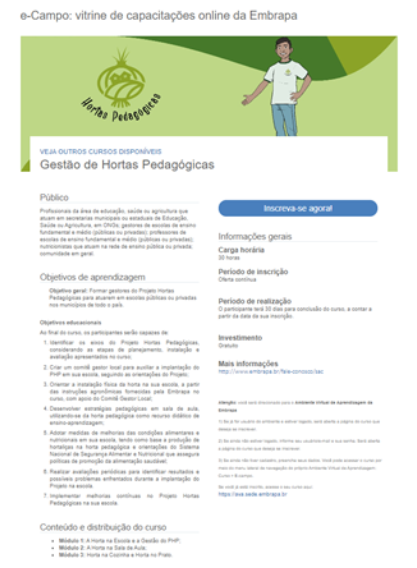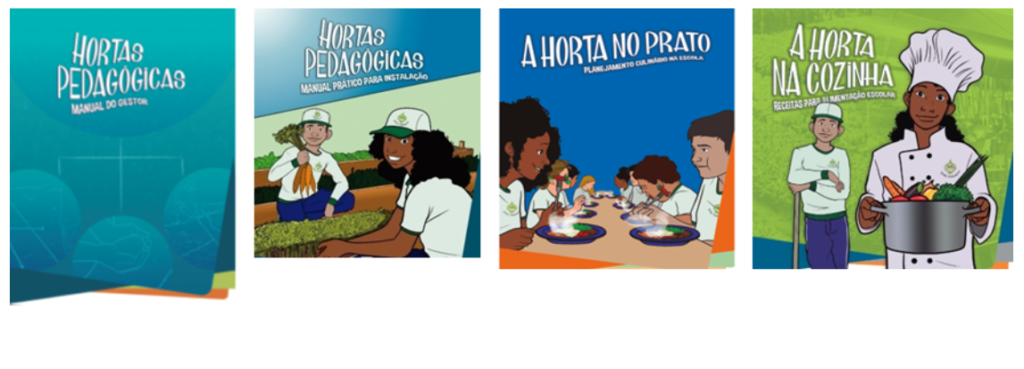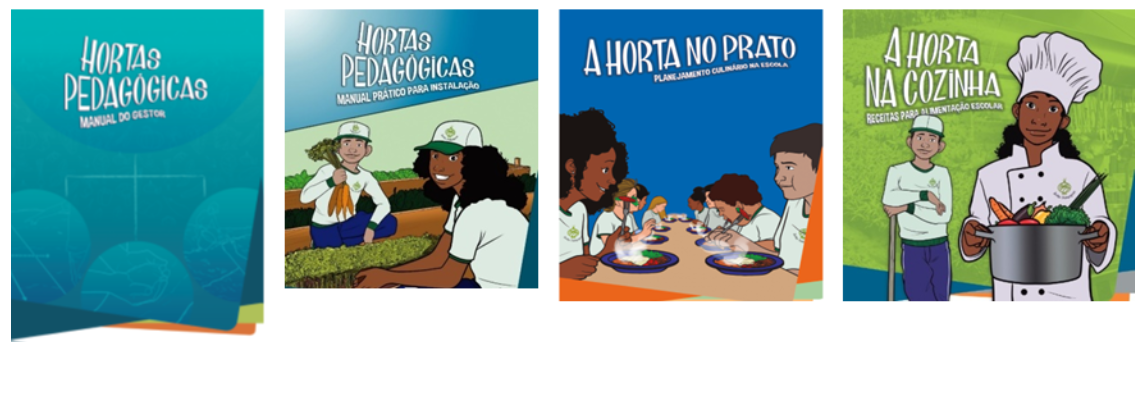Background
The Pedagogical Gardens Project was developed through a partnership between the Ministry of Citizenship and the Brazilian Agricultural Research Company (Embrapa, for its acronym in Portuguese) and had the support of the National Fund for Educational Development (FNDE, for its acronym in Portuguese), which is a Reference institution in Brazilian education.
The Project’s objectives are: to encourage the consumption of vegetables by students and their families, based on food and nutrition education actions and the provision of these foods in the school feeding; promote the care of the garden, involving the different actors of the school community; provide vegetables in school meals; and, promote the use of the garden as a pedagogical resource.
The methodology proposed by the Project was implemented in a pilot stage in four schools in the municipalities of São Luís – Maranhão and José de Freitas – Piauí, and is consolidated in the Distance learning course of Management of Pedagogical Gardens since 2020.
Developed activities
The content of the distance learning course – Management of Pedagogical Gardens addresses the methodology tested through the Pedagogical Gardens Project, which consists of four axes and includes actions for different audiences in the school community: teachers, managers, cooks, nutritionists and students. The course has the following topics as content (1) Garden at school, which deals with planning, community mobilization and physical installation of the garden (agronomic management of crops); (2) Garden in the kitchen, which aims to promote better food and nutritional conditions for students, addressing good cooking practices and recipes that encourage the use of vegetables, such as those produced in the school garden; (3) Garden on the plate, which seeks to involve nutritionists in the process of selecting vegetables for planting and promoting their use in school feeding; and (4) Garden in class, which aims to explore the full potential of the garden in its pedagogical aspect at school, with practical activities for students.
The course has been available since 2020, has a 30-hour course load, is online, free and freely accessible. The participant will have 30 days to complete the course, from the date of registration. It can be accessed through the link: https://www.embrapa.br/e-campo/gestao-de-hortas-pedagogicas
Methodology
The course’s general objective is the training of managers of the Pedagogical Gardens Project to work in public or private schools in municipalities throughout the country.
At the end of the course, participants are expected to be able to:
- Identify the axes of the Pedagogical Gardens Project considering the planning, installation and evaluation stages presented in the course;
- Create a local management committee to help with the implementation of the Pedagogical Gardens Project in the school, following the guidelines of the Project;
- Guide the physical installation of the garden in their school, based on the agronomic guidelines provided by Embrapa in the course, with the support of the Local Management Committee;
- Develop pedagogical strategies, using the pedagogical garden as a didactic resource for teaching and learning, adaptable to all subjects addressed in primary school;
- Adopt measures to improve the food and nutritional conditions of your school, based on the production of vegetables in the educational garden and guidelines of the National System of Food and Nutrition Security, which ensures policies to promote healthy eating;
- Carry out periodic evaluations to identify results and possible problems faced during the implementation of the Project in the school; and,
- Implement continuous improvements in the Pedagogical Gardens Project in your school.
The course is divided into three modules:
Module 1: The Garden at School and PHP Management;
Module 2: The Garden in the class; and,
Module 3: Garden in the Kitchen and Garden on the Plate.
Institutions involved
Ministry of Citizenship; Embrapa and FNDE.
Qualitative and quantitative data
The Distance Learning Course Management of Pedagogical Gardens contributes to:
- training of agents from the school community to implement and maintain school gardens;
- the introduction of new vegetables in school and family menus;
- improvement in the food and nutritional security conditions of the school community;
- encouraging the integration of members of the school community and collective work;
- greater interaction between teachers / students / staff / parents; and the involvement of students with the school garden and, consequently, the improvement in the level of learning.
Description of beneficiaries (number and audience)
It is expected that the course will be taken by the following audience: professionals in the area of education, health or agriculture who work in municipal or state departments of Education, Health or Agriculture, in NGOs; administrators of primary and secondary schools (public or private); elementary and high school teachers (public or private); nutritionists who work in the public or private education network; community in general.
Results achieved
Through the Distance learning course Management of Pedagogical Gardens, available online by Embrapa, around 15,000 people from all Brazilian states and even Latin American countries have already been trained.
Challenges and advances
The Pedagogical Gardens project and the Distance learning course Management of Pedagogical Gardens are strategies aimed at improving the eating conditions of children and adolescents of school age, with that their biggest challenge is to become a public policy adopted by municipal, state and federal governments , so that schools can obtain resources for its implementation and so that its methodology can be adopted in the Pedagogy course as one of the most important didactic resources that teachers can use in the teaching-learning process.
Last but not least, it is necessary to expand the dissemination of the project and the course by making them known to all schools and institutions involved in the teaching-learning process.









